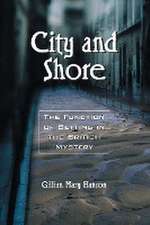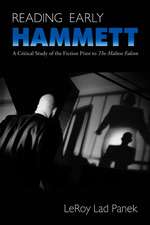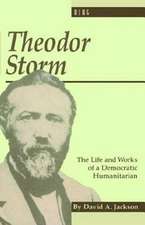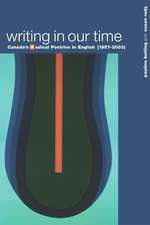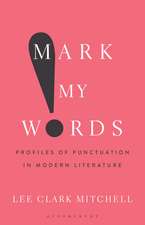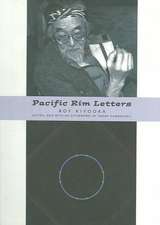The Diseased Brain and the Failing Mind: Dementia in Science, Medicine and Literature of the Long Twentieth Century: Explorations in Science and Literature
Autor Dr Martina Zimmermannen Limba Engleză Paperback – 26 ian 2022
| Toate formatele și edițiile | Preț | Express |
|---|---|---|
| Paperback (1) | 198.93 lei 6-8 săpt. | |
| Bloomsbury Publishing – 26 ian 2022 | 198.93 lei 6-8 săpt. | |
| Hardback (1) | 599.41 lei 6-8 săpt. | |
| Bloomsbury Publishing – 22 iul 2020 | 599.41 lei 6-8 săpt. |
Preț: 198.93 lei
Preț vechi: 258.49 lei
-23% Nou
Puncte Express: 298
Preț estimativ în valută:
38.07€ • 39.50$ • 31.82£
38.07€ • 39.50$ • 31.82£
Carte tipărită la comandă
Livrare economică 15-29 martie
Preluare comenzi: 021 569.72.76
Specificații
ISBN-13: 9781350249363
ISBN-10: 135024936X
Pagini: 284
Dimensiuni: 156 x 234 mm
Greutate: 0.4 kg
Editura: Bloomsbury Publishing
Colecția Bloomsbury Academic
Seria Explorations in Science and Literature
Locul publicării:London, United Kingdom
ISBN-10: 135024936X
Pagini: 284
Dimensiuni: 156 x 234 mm
Greutate: 0.4 kg
Editura: Bloomsbury Publishing
Colecția Bloomsbury Academic
Seria Explorations in Science and Literature
Locul publicării:London, United Kingdom
Caracteristici
Explores changing cultural understandings of dementia and alzheimers in 20th century scientific and literary texts
Notă biografică
Martina Zimmermann teaches at the University of Warwick, UK, and is Privatdozentin at Goethe University Frankfurt, Germany. She trained as a pharmaceutical scientist and specialized in neuropharmacology before moving into research in the health humanities. She is the author of The Poetics and Politics of Alzheimer's Disease Life-Writing (2017). She has recently been awarded a UKRI Future Leaders Fellowship with which she returns to the Department of English at King's College London, where this monograph had been researched.
Cuprins
Acknowledgements1: IntroductionAlzheimer's disease: the twenty-first-century first-world scareDementia in historyMethodology: literature and scienceOverviewPart I: The Organic Paradigm2: From brain inspection to cell deathThe Forsyte Saga: the cultural image of dementia in the fin-de-siècle family novelDementia and memory loss in science, medicine and literature before 1880Auguste D. and Johann F.: Alzheimer's clinical cases and histological researchDegeneration: the old and new narrative of loss and decline in medico-scientific literature on dementia and Alzheimer's diseaseThere Were No Windows: the patient's illness experience in the modernist novelPart II: The Ageing Perspective3: Culture shapes politics shapes scienceResearching old age: from medical science to old-age psychiatryAt The Jerusalem: dementia defines the elderly in 1960s' new realist fiction4: The loss of self in healthcare and cultural discourseCaregiver guides: helpers in the face of loss and declineOut of Mind: the postmodern novel delves into the mind of the patientPart III: The Cognitive Picture5: The narrative of loss in a growing biomedical and literary marketplace of Alzheimer's diseaseNeurodegeneration: the biochemical narrative of lost molecules, pathways and communicationOn genes and genealogy: the patient as specimen, carrier and type in research and popular scienceDeath in Slow Motion: past identities, lost plots and old age in caregiver life-writing6: Neuro-technologies and narrative examine the failing mindThe visual exploration of the brain and fascination with the mindThe Dying of the Light: detective fiction claims back patient authorityWho Will I Be When I Die?: patient life-writing around the year 2000Part IV: The Whole-Person Prospects7: The dichotomy of Alzheimer's diseaseImmunization hope and hype: the patient as non-responderLa guardiana di Ulisse: the patient beyond forgetting in children's literature and adult fiction of the new centuryAlzheimer mon amour: healthcare changes and patient personality in contemporary caregiver memoirsWe Are Not Ourselves: the cultural image of Alzheimer's disease in the twenty-first-century Bildungsroman8: ConclusionNotesGlossaryBibliography
Recenzii
Zimmermann's analysis of literature, medicine, and science addressing dementia and caregivingin diverse cultures is a reminder of the importance of cross-disciplinary and cross-cultural knowledgefor social workers.
Martina Zimmermann's The Diseased Brain and the Failing Mind summarizes the preoccupation of Western culture with dementia as defining not only the aging process but also the very essence of the identity. Zimmermann, a trained neuro-scientist and a sharp-eyed literary critic, illustrates how scientific models of mind and brain, of neural networks and brain chemistry, reflect the cultural assumptions of how mind, brain, and body are believed to function. Her close reading of the literary reflections on aging and dementia from the Edwardians to contemporary film shows that science is as often indebted to cultural paradigms as cultural paradigms reflect scientific assumptions. If you still believe that playing Sudoku will prevent you from developing Alzheimer's perhaps you should better spend your time reading this book!
Martina Zimmermann's The Diseased Brain and the Failing Mind summarizes the preoccupation of Western culture with dementia as defining not only the aging process but also the very essence of the identity. Zimmermann, a trained neuro-scientist and a sharp-eyed literary critic, illustrates how scientific models of mind and brain, of neural networks and brain chemistry, reflect the cultural assumptions of how mind, brain, and body are believed to function. Her close reading of the literary reflections on aging and dementia from the Edwardians to contemporary film shows that science is as often indebted to cultural paradigms as cultural paradigms reflect scientific assumptions. If you still believe that playing Sudoku will prevent you from developing Alzheimer's perhaps you should better spend your time reading this book!












